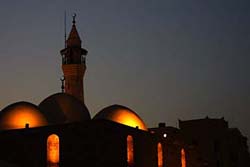Unlocking Beirut
Travel Stories: When Catherine Watson left Lebanon's capital city in the 1960s, she carried home the key to her former apartment. Forty years later, she returned with her prized souvenir and found it could still open doors.
12.29.06 | 1:23 PM ET

If the key had been pretty, I could have worn it around my neck like jewelry for the last 40 years, but it’s utterly plain—bronze-colored, round-headed, the kind the Yale company stamps out by the millions every year.
I have kept it anyway, not for its looks, but for what it meant. It was the key to my first apartment, and it opened much more than a front door. It opened a whole city to me. It opened my eyes. It opened my life.
This is the address the key belonged to: No. 1, Makdisi Building, Rue Jeanne d’Arc, Beirut, Lebanon.
I lived there in the summer of 1963, when I was 19. Grew up there, is more like it. I fell in love that summer, got—not my first kiss—but the first I wanted, learned to smoke, drank too much Lebanese beer, worked at being sophisticated.
That summer also turned my future upside down. Now I would just say I changed careers, but back then I didn’t have one to change. Back then, I just felt lost. Beirut became my comfort.
I had loved it from the start. When my college group stepped out of the plane on our first evening there and started down the shuddering aluminum ladder to the tarmac, the warm, scented air of the city rose up around my bare legs—ankles, knees, thighs, as if I were wading into bathwater. It was the most sensuous thing I had ever known.
No. 1, Makdisi was the address that got us our mail—a mild flood of flimsy blue envelopes from our families in the Middle West of the United States to their exchange-student offspring in the Middle East.
There were 10 of us, five men, five women, all Minnesota undergraduates working on projects we’d proposed the previous year. I remember only three: Jim investigated the politics of student groups; Kirsten focused on the rights of women, and I studied archaeology, something I’d dreamed of since I was old enough to read.
The men lived in a dorm on the pine-shaded, sea-side campus of the American University of Beirut, always referred to simply as the A.U.B. The women rented an apartment nearby, and the men came over all the time to use the phone.
I was assigned to a small A.U.B. dig in the Bekaa, Lebanon’s long central valley, and went down to Beirut whenever I could. As the summer wore on, that was more and more often.
I had arrived in Lebanon believing that archaeology would be what my favorite books had promised me all my life—an endless stream of rich discoveries and richer adventures, Egypt one year, Yucatan the next, and so on and on, all over the globe. But the real thing wasn’t like that. All the days were the same, and there was no treasure.
The archaeologists took long midday siestas, to avoid the worst of the sun. I read a lot and practiced smoking. Soon, the best things in my life were listening to jackals howl around the dig house at night—and planning what I’d do next weekend, back in Beirut.
Didi 12.21.08 | 4:36 PM ET
Beautiful article!
Jillian 12.02.09 | 2:26 PM ET
What a beautiful piece. I’m about to make my first trip to Beirut this weekend and have been eating up as much travel writing about the city as I can…but this is by far the most beautiful and personal piece I’ve found. Thank you for writing it.